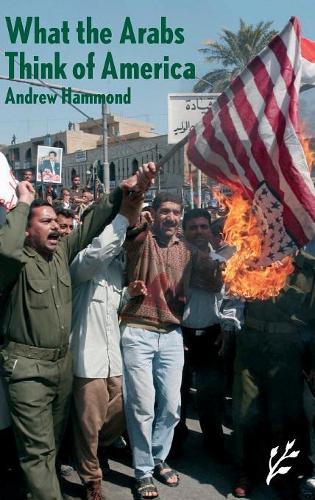
What the Arabs Think of America
(Hardback)
Publishing Details
What the Arabs Think of America
By (Author) Andrew Hammond
Bloomsbury Publishing PLC
Greenwood Press
30th June 2007
United States
Classifications
General
Non Fiction
303.482174927073
Physical Properties
Hardback
246
Width 156mm, Height 235mm
567g
Description
For hundreds of years, pilgrims to Mecca have paused in the narrow mountain pass known as Mina to cast stones at the three pillars of the Jamaraat in a symbolic casting out of the Devil. Recently, someone added graffiti to the central pillar, four Latin letters of the English script - Bush. These days, Americans and America provoke strong opinions from Arabs of all sorts, from politicians and journalists to the ordinary men and women of 'Arab Street'. Their voices aren't always heard in the West, but for over a decade British journalist Andrew Hammond, based in the Middle East, has been listening to what they have to say, and in this book they are heard loud and clear. Many of the issues are political. What do the Arabs think of American support for Israel or its close relationship with Saudi Arabia How have they reacted to the American occupation of Iraq But American influence in the Arab world isn't limited to politics. What is the Arab view of American film, television or the latest hip-hop or rap music And what, for that matter, do Arabs think of Americans themselves, their life-style, attitudes and character Incorporating interviews with individuals of all sorts from all over the Arab world, What the Arabs Think of America gives voice to the unheard partner in a relationship in crisis. After an introductory chapter describing the historical background, six chapters are devoted to issues of crucial importance to Arabs: 1) 'Domestic America' (exploring Arab enthusiasm for American pop culture, admiration for the US as a land of freedom, and ambivalence about religion in America); 2) 'The Palestinians' (showing how US policy towards Israel and Palestine has come to dominate Arab views of the US in recent years); 3) 'The Iraq Project' (articulating Arab theories about American motives for the invasion and reactions to the occupation, including the Abu Ghraib scandal); 4) 'Peace with Egypt' (highlighting the general Arab view that America's brokerage of the 1979 Camp David agreement deliberately split the Arab world in its opposition to Israel); 5) 'The House of Saud' (reviewing Arab distrust of the close relationship between the ruling Saudi royal family and the US since the monarchy allowed US companies to drill for oil in the 1930s); and 6) 'The Sudanese Card' (exploring Arab dismay at American support of south Sudanese Christian separatists at war with the Islamic north). A short chapter speculating on likely future developments in the Arab-America relationship concludes the book. A Chronology, Glossary (of Arab institutions, political parties, historical events, etc.), Biographies (of key Arab figures) and Bibliography help orientate the reader.
Reviews
This is a well-documented and timely volume since there are currently few other works dealing with the same subject. The book is based on the author's.thorough knowledge of Middle Eastern countries, their history, and politics before and after 9/11/2001; interviews with Arabs of various political persuasions and social strata; his own witnessing of events; and writings of political analysts and novelists. * MultiCultural Review *
[A] timely and informative study. * Arab News *
Author Bio
Andrew Hammond is a journalist who has written extensively about the Middle East, reporting from many countries including Egypt, Sudan, Israel and the occupied territories, and Iraq. He is currently Reuters Senior Correspondent in Saudi Arabia. He is the author of Popular Culture in the Arab World (2004).
